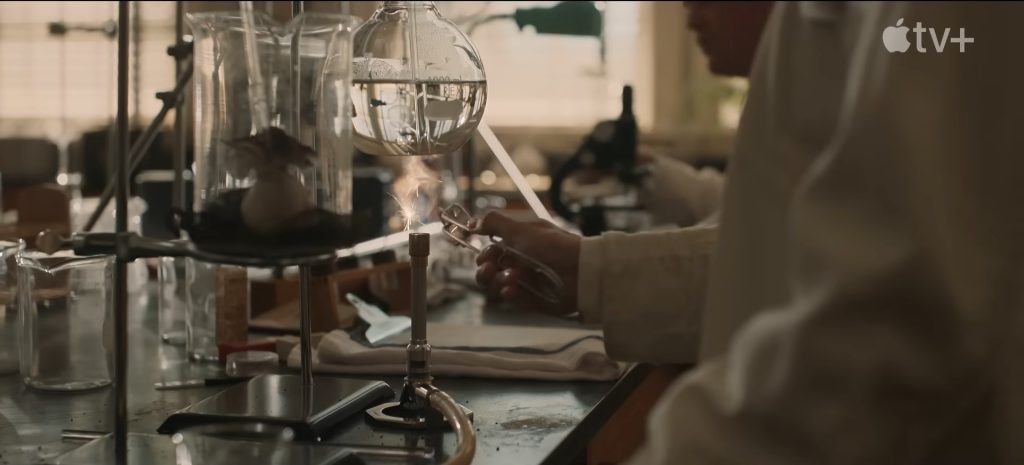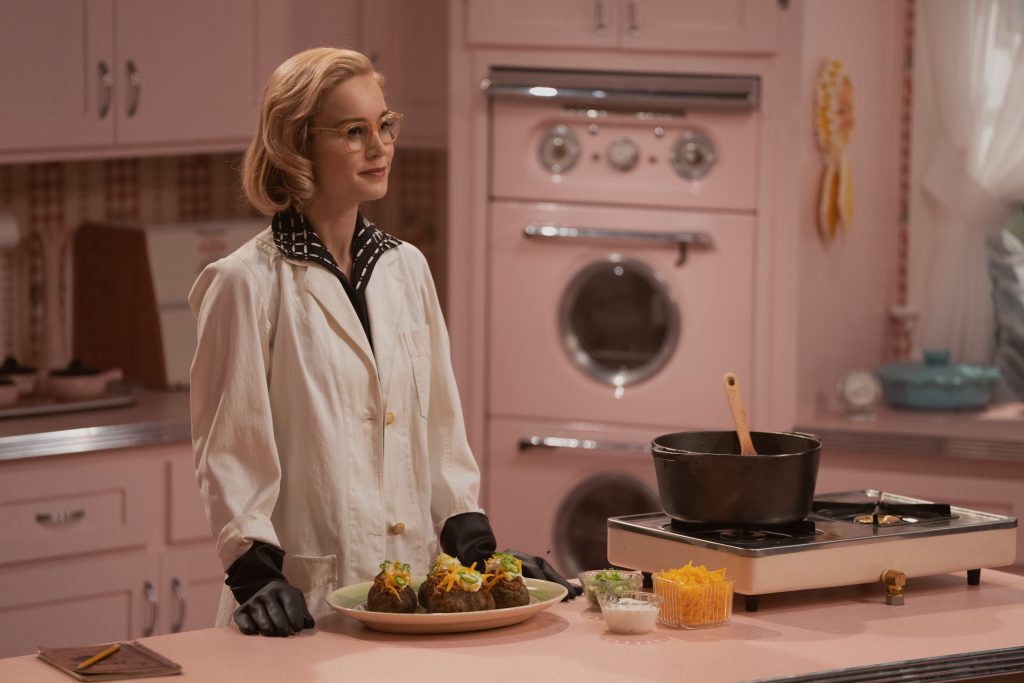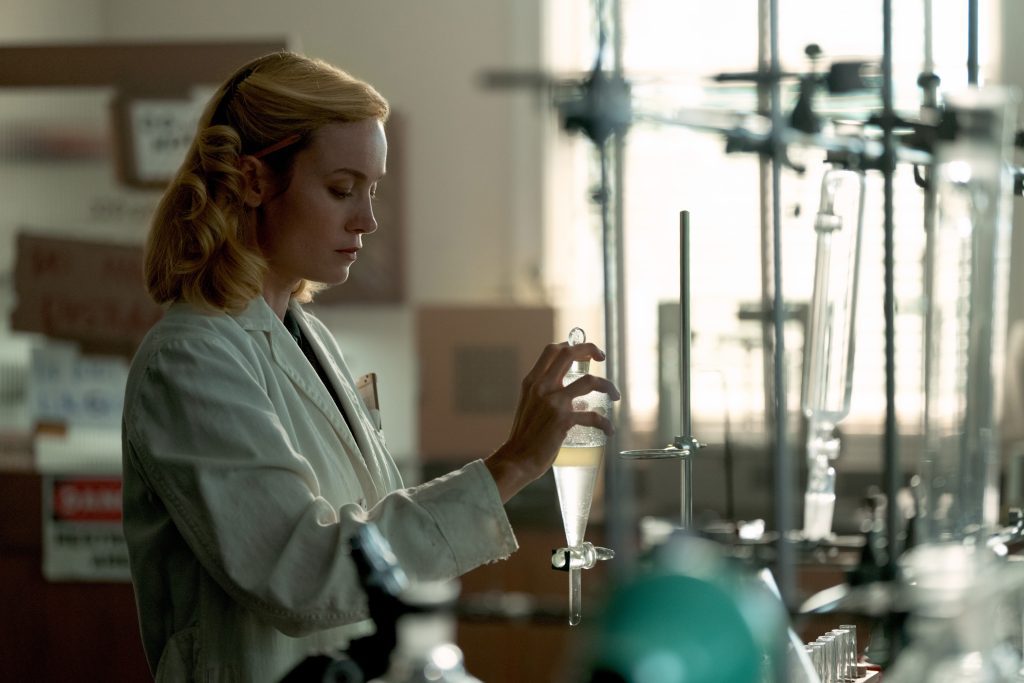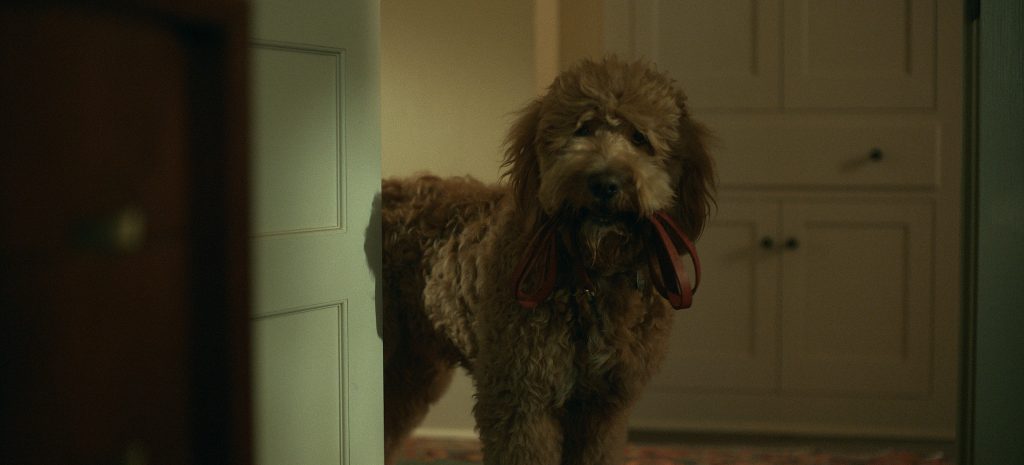Lessons in Chemistry is one of the newest series on AppleTV+ and stars Brie Larson as Elizabeth Zott, a chemist working in a male dominated lab who gets fired and starts her own chemistry-based cooking show. It’s a wonderful show that is the perfect recipe of cooking, chemistry, and heart.
I recently sat down with the show’s food consultant Courtney McBroom to chat about her involvement in the series. McBroom is a chef, cookbook author, and founder of the Los Angeles-based Ruined Table. She was formerly the culinary director of Momofuku Milk Bar and has been featured on shows like Chef’s Table, Mind of a Chef, Vice Munchies, and Bong Appetit. In our interview, we discuss working on set as a food consultant, crafting the series’ perfect recipes, and yes, the adorable goldendoodle Gus who stars as Six-Thirty.
What’s the recipe for the perfect coffee? I know we see that in the first two episodes a lot; her making that perfect coffee and I got very Breaking Bad vibe with Gale and the whole beakers. I feel like she would make the perfect coffee.
Courtney McBroom: Of course she does!
So did you devise a perfect coffee recipe?
McBroom: Actually I did not devise a perfect coffee recipe. I know my personal perfect coffee recipe.
What’s that?
McBroom: It’s in a beaker. I use a beaker.
Do you really?
McBroom: No, I’m kidding! No, I do cold brew. But yeah, I don’t know what the coffee recipe is. I think that’s like a mystery of the universe. People are so particular about coffee. Is there a perfect coffee? One person’s perfect coffee is another person’s worst.
Right?
McBroom: We weren’t even going to try and touch that.
Because then you’d have people emailing you being like, “You’re doing this wrong. You have to use these beans.”
McBroom: “Excuse me, ma’am!” Yeah, I don’t need those trolls.

Exactly. During the pandemic shutdown that was my thing where I really got into coffee.
McBroom: What do you do?
I do French Press.
McBroom: French Press is good. I have a French Press too.
What’s your cold brew technique? What’s your secret to cold brew?
McBroom: Well, a lot of times it depends on how I’m feeling. Sometimes I’ll just buy the concentrate, but sometimes I’ll use a French Press to make cold brew. And you grind, you know, the French Press grind size, and I’ll fill the French Press with the coffee and the water and literally just let it sit. It’s really easy to make cold brew. You just let it brew overnight. People always think it’s this really long process, but you just brew it overnight and then I press the French Press and then I have cold brew in the next morning.
Speaking of recipes and stuff, is there gonna be a cookbook? I feel like there has to be a Lessons in Chemistry cookbook.
McBroom: I know! There really needs to be one. I don’t know about a cookbook, but what I do know for sure is that we are releasing mini recipe cards. So there are going to be recipes from the show and from the book. There’s the lasagna is coming out. The galette that you saw, we’re releasing that recipe. And then as the show progresses, we’re going to keep releasing more recipes throughout.
Nice. That’s going to be exciting.
McBroom: I know!
I definitely want to try the lasagna. I’ve made lasagna before. But I definitely want to try the show’s version.
McBroom: This one’s really good. It’s much like the coffee. So this is the perfect lasagna, but also lasagna can be a very personal thing too so you can make the lasagna be your own. You can use this as like a jumping off point for your own version of the perfect lasagna.
There we go. It’s perfect for me.
McBroom: Exactly, exactly.
Did you have a favorite recipe from the series?
McBroom: I think the lasagna. Lasagna, hands down, is like the recipe, and I love lasagna. I’ve always made lasagna my whole life. So I think if I had to choose one favorite, it was a very tough choice, but it would be lasagna. And the one thing too that I love about the lasagna is it’s kind of symbolic of who Elizabeth Zott is as a person; layered, complex. The way that she approaches lasagna, trying to make it perfect, is also the way that she approaches herself. The whole storyline, the arc of the story, is Elizabeth realizing that you don’t have to be perfect. You can be good enough, and that’s great. And so I think lasagna is a great way to kind of tell that story in a food way.

Yeah, I love that. The show is set in the 50s. Did you have to alter the recipes? Kind of look at the way these foods were made in a new style? What kind of research did you do to get into that mindset?
McBroom: I’m obsessed with vintage cookbooks. I already have a huge collection. I have like the Betty Crocker recipe card collection and so I already know somewhat a lot about all that food, but one thing also that we really wanted is that we wanted Elizabeth’s cooking to not be fully 50s. She’s a woman of her time, she’s a woman of the 50s of course, but she’s also a woman ahead of her time. And so we wanted that to be reflected in her food as well. We wanted everything to be made with super fresh ingredients, everything from scratch. There’s a lot of canned goods in 50s cooking. There’s a lot of jello salad.
I was about to say, are we gonna get a jello mold dish?
McBroom: There is a jello mold, but it’s not one that Elizabeth makes. We stay true to the food of the 50s for everyone else, but with Elizabeth, we take some liberties because we want to show how far ahead of her time she is in her thinking and how she is, like, “No, no canned stuff. We use only the good stuff. Only the fresh ingredients.” Because food nourishes, and she knows that.
And I love the chemistry, the actual chemistry behind it like when she’s explaining about the whole melting thing. I didn’t understand many of those words and stuff. It’s all so complex.
McBroom: It’s all true though. If you Google it, it’s all backed up. It’s all true science.
How much of that did you know beforehand? Did you learn more about cooking from being involved in this show?
McBroom: Some stuff for sure. The sodium citrate thing for the lasagna I already knew, because I like to make nacho cheese a lot, and that’s kind of a secret ingredient that we use sometimes. And like the Maillard reaction I knew about, but there’s a lot of other ones where I was like, “Oh my goodness. That’s amazing!” I’m a food consultant, but we also had chemistry consultants on the show too, which were key. Very important.
Yeah. You got to make sure that chemistry is right.
McBroom: Oh my god. You know everyone’s gonna double check.
Especially with what’s on the boards and everything. People will freeze frame and go and make sure and double check. It’s crazy.
McBroom: I love it though.

I love set food. It just fascinates me. You have a lot of food in the show, of course. So creating these dishes for set, for film, what is that process like? Are you doing different recipes based on whether or not this is just going to be a food shot of a dish or whether they actually have to eat it and put in their mouth? What kind of discussions are you having about how are we going to do this scene? How do we want the food presented?
McBroom: Basically we knew we wanted everything to be authentic. We wanted, even if it wasn’t necessarily for sure going to be bitten into, there’s always a chance. Because sometimes they’re like, “You know what, let’s have Elizabeth actually taste this.” And I know a lot of people have asked what are the tricks you use? Like how to make it extra delicious. There’s really no tricks that we use. We want the food to be exactly as it’s made, as it would be normally made, and that’s the best way, in my opinion, to make it look delicious. The only trick that we would do is like if it needed some finessing would be like spray it with or brush it with a little bit of olive oil to make it glisten or with some water. But really, all the food was real. All the food was made with love. Because that’s also an important ingredient! We didn’t use any tricks, and we made it good. Like really delicious because we also wanted the actors, if they had to taste it we don’t want them to be like you know, “emmmmm…” And also because we’re making so much food because we have to make enough for like 20 takes, we knew that we we’re gonna have leftovers. So we wanted to be able to like, “Here we have this extra lasagna. Take some home.” We gave so much food to the crew. Stuff that wasn’t edible because it had been sitting out all day under a hot light we would compost. Composting with a huge thing on the set, and everyone was really good about that. We gave a lot of it away too.
We have an amazing goldendoodle. No, shame to Brie or Lewis but whenever he was in frame he stole the scene.
McBroom: So the dog’s name who played Six-Thirty, his name is Gus. So cute. So amazing. I love Gus.
He was the best. Did you get any chance to create any food for him?
McBroom: That’s such a good question. You know, I was actually just talking about this yesterday with Amanda that we need to do that. We need to do recipes for Gus. I didn’t, for the show, make any food. He ate some compost in the very beginning. Then he just ate regular dog food mostly in the show. So I didn’t make any special Gus recipes, but I’m not opposed to doing that. I think there’s a reboot maybe. There’s like going to be a whole Gus segment. A Gus booking segment. We’re taking Gus on the road.
I am all for that!
McBroom: Me too!
We will tell Apple.
McBroom: Yes, tell them. More Gus! More Gus!

What advice would you give to someone who is just starting out cooking? Because I feel like this show is going to inspire a lot of people to cook and want to get into that.
McBroom: Like in a professional way or just to cook?
Just for a home cook.
McBroom: So the advice that I would give to actually professionals or home cooks is don’t be afraid to make mistakes. That’s the only way to learn. Still to this day I make mistakes. Not everything always turns out great, but that’s how you learn, and that’s how you tweak. Also the other thing I would say is don’t be afraid of salt. Usually people under salt things a lot of times. Just add a little bit more salt. Makes it shine.
That probably goes into my next question, what lesson in cooking would you say applies best to life as well? Because in Lessons in Chemistry, there’s a lot of overlap.
McBroom: You know, I think tweaking. So when you’re cooking something, you’re tasting along the way and you tweak it, and I think life is the same way. Sometimes you’re living a life and something happens and it’s not exactly what you thought it was going to be and you need to tweak, you need to pivot, you need to add a little salt, or maybe a little sugar. I think life is the same way. It’s to remain flexible. Remain flexible in cooking, remain flexible in life. Enjoy the moment. Taste along the way, but also make moves when you need to.
Lessons in Chemistry is now streaming weekly on AppleTV+. New episodes drop every Friday.







